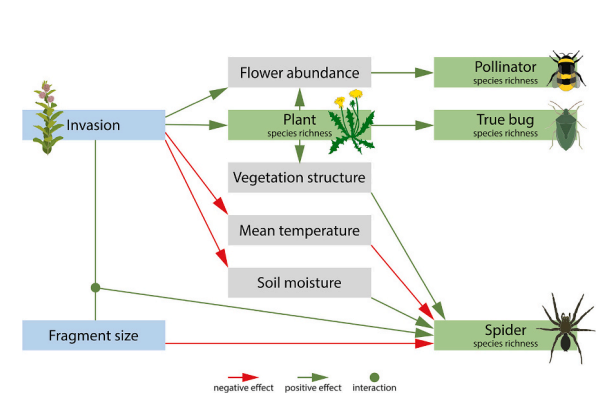- Szerzők: Gallé Róbert, Tölgyesi Csaba, Szabó Ágota Réka, Korányi Dávid, Zoltán Bátori, Hábenczyus Alida, Török Edina, Révész Kitti, Torma Attila, Gallé-Szpisjak Nikolett, Lakatos Tamás, Batáry Péter
- Megjelenés: 2023.12.10. Science of the total environment 903 Paper: 166199, 11 p.
- URL: https://www.sciencedirect.com/science/article/pii/S0048969723048246?via%3Dihub
- DOI: https://doi.org/10.1016/j.scitotenv.2023.166199
- MTMT azonosító: 34092814
Absztrakt: Plant invasion and habitat fragmentation have a detrimental effect on biodiversity in nearly all types of ecosystems. We compared the direct and indirect effects of the invasion of the common milkweed (Asclepias syriaca) on biodiversity patterns in different-sized Hungarian forest-steppe fragments. We assessed vegetation structure, measured temperature and soil moisture, and studied organisms with different ecological roles in invaded and non-invaded sites of fragments: plants, bees, butterflies, flower-visiting wasps, flies, true bugs, and spiders. Temperature and soil moisture were lower in invaded than in non-invaded area. Milkweed had a positive effect on plant species richness and flower abundance. In contrast, we mainly found indirect effects of invasion on arthropods through alteration of physical habitat characteristics and food resources. Pollinators were positively affected by native flowers, thus, milkweed indirectly supported pollinators. Similarly, we found higher species richness of herbivores in invaded sites than control sites, as species richness of true bugs also increased with increasing plant species richness. Predators were positively affected by complex vegetation structure, higher soil moisture and lower temperature. Furthermore, increasing fragment size had a strong negative effect on spider species richness of non-invaded sites, but no effect in invaded sites. Especially, grassland specialist spiders were more sensitive to fragment size than generalists, whereas generalist spider species rather profited from invasion. Although milkweed invades natural areas, we did not identify strong negative effects of its presence on the diversity of the grassland biota. However, the supportive effect of milkweed on a few generalist species homogenises the communities. The rate of invasion might increase with increasing fragmentation, therefore we recommend eliminating invasive plants from small habitat fragments to preserve the native biota. Focusing also on generalist species and revealing the indirect effects of invasions are essential for understanding the invasion mechanisms and would support restoration efforts.



